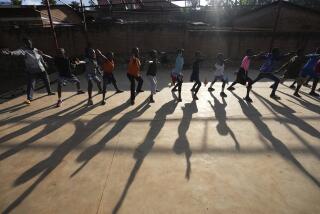Albright Urges Reconciliation in Rwanda
- Share via
KIGALI, Rwanda — Secretary of State Madeleine Albright preached peace and national reconciliation Thursday in Rwanda, although reports of a new massacre in the northwest corner of the Maryland-sized country indicates that the 1994 orgy of killing may be staging a comeback.
A U.S. official traveling with Albright described as a “genocidal insurgency” the conflict between the Rwandan army and remnants of the Hutu military forces, blamed for the slaughter of more than 800,000 civilians three years ago.
“The genocide continues,” the official said. “The killers are not as well organized [as they were when they were the government in 1994], but their objectives are unchanged.” He said the Hutu radio station that fueled the earlier killings with anti-Tutsi diatribes is back on the air, probably from someplace in the neighboring Democratic Republic of Congo.
The official also noted that government troops too have committed atrocities during the conflict, which began in March.
In public, Albright praised the Tutsi-led government that overthrew the genocidal Hutu regime in 1994. She hailed the government’s efforts to return refugees to their homes and begin the long process of national reconciliation.
But privately, aides said, she warned President Pasteur Bizimungu and Vice President Paul Kagame, considered the power behind the regime, that unless the government prevents the “excesses” of its soldiers it may forfeit international goodwill and support.
The security issue was an even bigger concern Thursday. Suspected Hutu rebels raided a Tutsi refugee camp in northwestern Rwanda, slaughtering more than 200 people and wounding almost as many, said the Office of the U.N. High Commissioner for Refugees in New York.
About 230 bodies were found in the camp, according to the U.N. refugee agency. Another 227 people, the Associated Press said, were hospitalized in Gisenyi, about 60 miles northwest of Kigali. About 90% of them had machete wounds, the U.N. refugee agency said.
This was the second attack on Mudende camp since August, when more than 100 refugees were killed in a raid blamed on Hutu rebels. The refugees, the Associated Press said, had fled neighboring Congo in mid-1996 to escape attacks by Hutu rebels, who were then based in camps in eastern Congo, formerly known as Zaire.
Rwandan officials who talked to visiting reporters Thursday in Kigali played down the renewed Hutu insurgency, insisting that the government will be able to bring the situation under control.
According to U.S. officials who attended Albright’s meetings with Rwandan leaders, Kagame said his government may have been lax in allowing former Hutu soldiers to return to the country with returning refugees. He urged the United States and the international community to ensure that refugee relief does not reach the former soldiers.
Human rights groups have accused the Rwandan army, aided by Tutsi troops from Congo, of retaliatory killings during the past several years. “The Clinton administration has achieved an ugly parity in its Central Africa policy: The U.S. essentially ignored the mass killing of Tutsi by Hutu extremists in 1994 and now ignores mass killing of Hutu by Tutsi soldiers in the Rwandan and Congolese armies,” said Leonard S. Rubenstein of Physicians for Human Rights, a Washington group.
“We’re urging [Albright] to read the riot act in Rwanda,” he said.
However, Albright was reluctant to criticize the government apart from her call on it to prevent its troops from attacking noncombatants in the course of its attempt to put down the Hutu insurgency.
“I think there clearly is room for improvement in the human rights record of Rwanda, and it’s very important for there to be a human rights unit here,” she told a joint news conference with Bizimungu. “But I think it is also important for us to understand how difficult it is for a country that has seen over a half-million people slaughtered to then be able to put itself back together and reconcile.”
Albright had planned to meet Thursday night in Kinshasa with President Laurent Kabila and other Congo officials, perhaps the most sensitive stop in her weeklong trek through Africa.
But her plane was unable to land in a thunderstorm because the pilot could not see the runway. He diverted to Luanda, Angola. By the time Albright arrived in Kinshasa, more than four hours late, the Kabila meeting and the rest of the schedule were put off until today.
More to Read
Sign up for Essential California
The most important California stories and recommendations in your inbox every morning.
You may occasionally receive promotional content from the Los Angeles Times.










